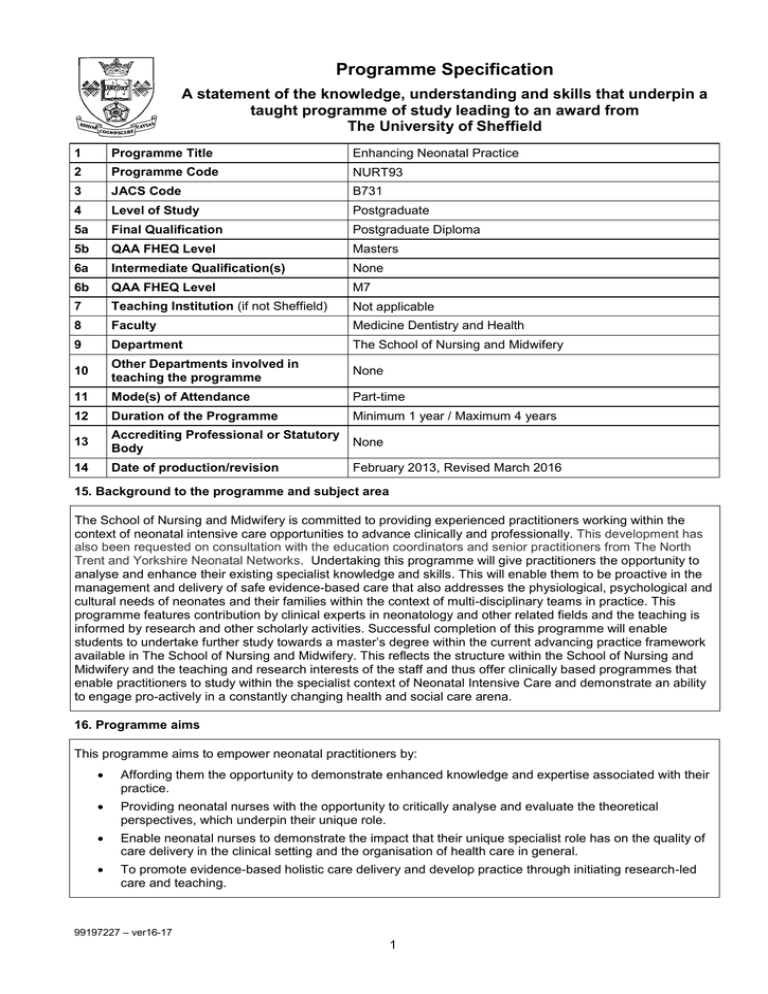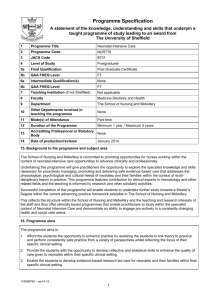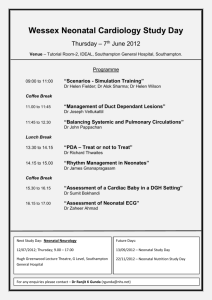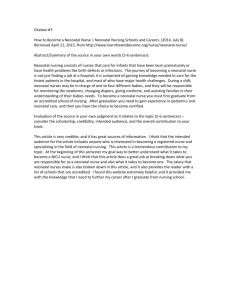Programme Specification
advertisement

Programme Specification A statement of the knowledge, understanding and skills that underpin a taught programme of study leading to an award from The University of Sheffield 1 Programme Title Enhancing Neonatal Practice 2 Programme Code NURT93 3 JACS Code B731 4 Level of Study Postgraduate 5a Final Qualification Postgraduate Diploma 5b QAA FHEQ Level Masters 6a Intermediate Qualification(s) None 6b QAA FHEQ Level M7 7 Teaching Institution (if not Sheffield) Not applicable 8 Faculty Medicine Dentistry and Health 9 Department The School of Nursing and Midwifery 10 Other Departments involved in teaching the programme None 11 Mode(s) of Attendance Part-time 12 Duration of the Programme Minimum 1 year / Maximum 4 years 13 Accrediting Professional or Statutory Body None 14 Date of production/revision February 2013, Revised March 2016 15. Background to the programme and subject area The School of Nursing and Midwifery is committed to providing experienced practitioners working within the context of neonatal intensive care opportunities to advance clinically and professionally. This development has also been requested on consultation with the education coordinators and senior practitioners from The North Trent and Yorkshire Neonatal Networks. Undertaking this programme will give practitioners the opportunity to analyse and enhance their existing specialist knowledge and skills. This will enable them to be proactive in the management and delivery of safe evidence-based care that also addresses the physiological, psychological and cultural needs of neonates and their families within the context of multi-disciplinary teams in practice. This programme features contribution by clinical experts in neonatology and other related fields and the teaching is informed by research and other scholarly activities. Successful completion of this programme will enable students to undertake further study towards a master’s degree within the current advancing practice framework available in The School of Nursing and Midwifery. This reflects the structure within the School of Nursing and Midwifery and the teaching and research interests of the staff and thus offer clinically based programmes that enable practitioners to study within the specialist context of Neonatal Intensive Care and demonstrate an ability to engage pro-actively in a constantly changing health and social care arena. 16. Programme aims This programme aims to empower neonatal practitioners by: Affording them the opportunity to demonstrate enhanced knowledge and expertise associated with their practice. Providing neonatal nurses with the opportunity to critically analyse and evaluate the theoretical perspectives, which underpin their unique role. Enable neonatal nurses to demonstrate the impact that their unique specialist role has on the quality of care delivery in the clinical setting and the organisation of health care in general. To promote evidence-based holistic care delivery and develop practice through initiating research-led care and teaching. 99197227 – ver16-17 1 17. Programme learning outcomes Knowledge and understanding: K1 Extend their existing knowledge and understanding of the development of the lungs, the related pathophysiology and management of oxygenation and ventilation for neonates requiring resuscitation at birth. K2 Extend their existing knowledge of the pathophysiology of the newborn renal system and of the skin and vasculature to enable cannulation and the management of fluid and electrolyte balance, intravenous fluids and medications. K3 Enhance their knowledge of the legal and ethical domains of practice and evaluate how their knowledge and skills an be extended within the scope of practice. K4 Extend their knowledge and skills to enhance the delivery of holistic evidence-based care that addresses the physiological, psycho-social, developmental and cultural needs of babies and their families who require specialist care at birth. K5 Enhance their knowledge of communication with the multi-disciplinary team in primary and secondary and intermediate care settings who work with families to deliver integrated care for babies who require specialised care at birth. Skills and other attributes: S1 Provide care delivered through the application of enhanced knowledge and skills to meet the needs of babies by providing emergency management at birth. S2 Enhance existing skills to be able to undertake cannulation and assessment for the provision of fluids and electrolytes, medications and intravenous fluids. S3 Use enhanced communication skills and professional and clinical decision making skills to create and maintain an environment in which colleagues and families are enabled to make informed choices. S4 Provide care which also addresses the diversity of families based on an assessment of their different cultural, spiritual and psychosocial needs which also accounts for the developmental needs of the babies. S5 Use their enhanced knowledge and skills to evaluate the contribution of current policy developments in the delivery of care to babies and their families. 18. Teaching, learning and assessment Development of the learning outcomes is promoted through the following teaching and learning methods: A wide variety of teaching methods and strategies will be utilised to provide stimulation and to ensure the varying learning styles of adult learners are met. These strategies include the following: Lectures: Guided study which provides a structured opportunity to disseminate information, this is the medium by which students access the main knowledge base (K&S 1-5). Seminars: which are either staff-led or student-led are used throughout the programme .They are designed to reinforce information imparted through lectures by allowing students to work through, analyse, understand and respond to that information. They are used to enable students to make the link between theory and clinical practice (K&S 1-5). Group tutorials: are meetings arranged between a lecturer and a small group of students in order to clarify a particular problem experienced by the student(s) in the understanding of material or to support the student(s) in the process of preparation for a seminar or assessment (K&S 1-5). Individual tutorials: are meetings arranged between a lecturer and an individual in order to clarify a particular problem experienced by the student(s) in the understanding of material or to support the student(s) in the process of preparation for a seminar or assessment (K&S 1-5). Independent Learning: is used to assimilate and clarify material explored in lectures, to prepare for seminars and assessments and to generally examine literature pertinent to the module outcomes (K 15). Reflection: Students are encouraged throughout their learning to reflect on their own clinical area and their own practice. This approach encourages critical and analytical thought and changes to practice (K&S 1-5). 99197227 – ver16-17 2 Opportunities to demonstrate achievement of the learning outcomes are provided through the following assessment methods: The units for this programme are assessed using a variety of methods Essay: Students critically analyse relevant issues arising from a problem/issue in clinical practice whilst undertaking the unit (K&S 1-5). Case Study: Students will examine an agreed clinical case in relation to the context of care for the specialist unit being undertaken. This will involve a critical analysis of the care received by the child or client and family (K&S 1-5). Clinical Skills: Formative assessment will be achieved by discussion with clinical practitioners using standards for neonatal practitioners set by NICE and BPAM (KS 1-5). 19. Reference points The learning outcomes have been developed to reflect the following points of reference: The Mission Statement of the University of Sheffield as presented in its corporate plan. The Mission Statement of the School of Nursing and Midwifery as presented within its strategy document. The appropriate qualification descriptors contained in the QAA Framework for Higher Education Qualifications in England, Wales and Northern Ireland. Subject benchmark statements for health care programmes. Professional points of reference indicated by the NMC (Nursing and Midwifery Council) and the Department of Health. ADC Plan of The University of Sheffield School of Nursing and Midwifery. Department of Health. National service framework for children, young people and maternity services. The Stationery Office. September 2004. The social partnership forum action plan for maximising employment opportunities for newly qualified health care professionals in a changing NHS. April 2007. Neonatal Tool Kit : Principle 5: Professional Competence Education and Training to develop further career options for neonatal nurses (DH 2009 pp 53 – 55). 20. Programme structure and regulations To register on this programme the student must have completed either: NURU144 BMedSci (Hons) Health and Social Care Studies (Neonatal Intensive Care) or equivalent or NURU 08 BMedSci (Hons) Clinical Nursing practice or equivalent or NURT78 PGCert in Neonatal Intensive Care The programme of study can be completed in not less than one year and not more than four years on a part time basis for those entering with the degree or evidence of relevant study and experience. Those entering with the Post Graduate Certificate (60 credits at level 7) must complete the programme in not less than one year and not more than two years part time. All must have had at least two year’s experience in the context of neonatal intensive care post qualifying and be on the appropriate part of the professional register. For those admitted with a post graduate certificate (NURT78): Students must complete the following 60 credits Enhancing skills in Emergency Management of the Neonate: 15 credits 99197227 – ver16-17 3 Holistic Care for Babies and Families: 15 credits Research Methodology: 15 Research design and Application 15 To complete the programme the student must relinquish their post graduate certificate before the award is made. For those admitted with an undergraduate qualification (NURU144 or NURU08) or who have demonstrate evidence of relevant study at level 6 and have relevant experience in the context of neonatal intensive care; Students must complete the following 120 credits Enhancing skills in Emergency Management of the Neonate: 15 credit Holistic Care for Babies and Families: 15 credit Then choose two further 30 credit units from within the post graduate diploma specialist routes of the advancing practice framework: Research Methodology: 15 Research design and Application 15 Detailed information about the structure of programmes, regulations concerning assessment and progression and descriptions of individual modules are published in the University Calendar available on-line at http://www.shef.ac.uk/govern/calendar/regs.html. 21. Student development over the course of study All of the above units must be successfully completed in order to achieve the award. The units can be accessed individually and in any order. The students will be given academic support by the programme leader for academic supervision tutorial support and guidance. This will ensure that the student has the most appropriate person to ensure continuity who also has the skills and knowledge of the specialist context of practice. The student will also be offered the opportunity of personal development planning in order for them to be able to identify their strengths and weaknesses so that appropriate academic support can be provided. This will also enable the student to make informed career choices and develop their confidence in articulating their potential confidently to prospective employers. 22. Criteria for admission to the programme Detailed information regarding admission to programmes is available from the University’s On-Line Prospectus at http://www.shef.ac.uk/courses/. This programme requires NMC registration. For admission onto this programme, students need to already have a nursing degree or have acquired 120 credits at Level 6, or the equivalent, or have completed the Post Graduate Certificate. In addition it is important that students are currently working within the relevant area of practice in order to fulfil the requirements of this programme. Although not a requirement of the programme, it is advisable that prospective students have the support of their managers. 99197227 – ver16-17 4 23. Additional information The School of Nursing and Midwifery is based at Barber House 387 Glossop Road Sheffield S10 2HQ Phone: 0114 222 2063 snm.enquiries@sheffield.ac.uk www.shef.ac.uk/snm Application for the units can be made by accessing www.shef.ac.uk/hsccpd (Look under Neonate, Children Family and Public Health) This specification represents a concise statement about the main features of the programme and should be considered alongside other sources of information provided by the teaching department(s) and the University. In addition to programme specific information, further information about studying at The University of Sheffield can be accessed via our Student Services web site at http://www.shef.ac.uk/ssid. 99197227 – ver16-17 5



